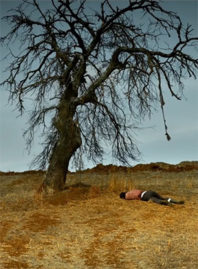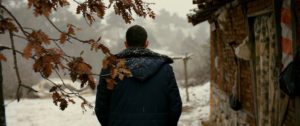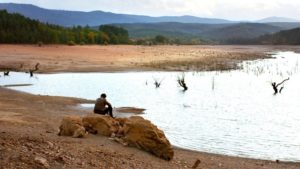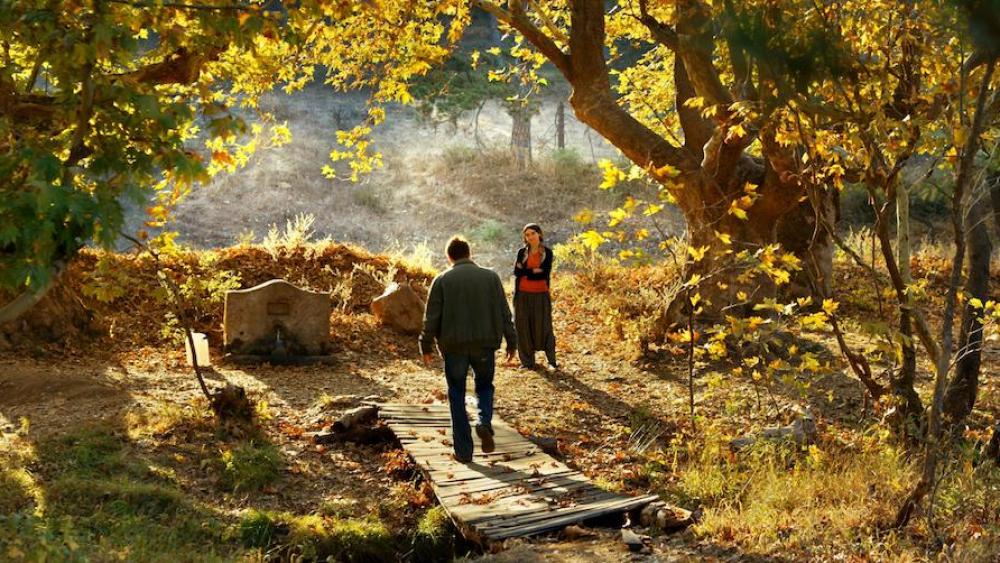
The Wild Pear Tree is my first Nuri Bilge Ceylan movie, a Turkish director with an intimidating filmography. He likes his running times long. A friend joked about the effects of Winter Sleep. This reputation made it seem like they required intense concentration. My experience with Turkish literature is as limited as it is with that country’s output, if not more so. But just like those books, it seems like he also addresses a sense of guilt. And in a way, this one addresses that guilt as it tells the story of a prodigal son. That prodigal son is Sinan Kurasu (Aydin Dogu Demarkol), an aspiring novelist who’s returning to Canakkale and his home town, Can. In doing so he has to deal with endless drama. Most of this drama involves his father Idris (Murat Cemcir). He’s a teacher who has renovations as one of his few addictions.
Idris’ only project is building a well in his father’s property. He convinced himself that there’s groundwater underneath the bedrock because of the presence of frogs. Meanwhile, his father whines about Idris’ obsession with turning the place green. It’s symptomatic of the discontent he has that Sinan shares. Cinematography plays into their mindset. Sinan specifically sees Cannakale and Can as a boring, ignorant hellhole. But Ceylan captures these areas beautifully, showing the golden hues in Idris’ fields. Films this year are about problematic utopias, but Ceylan crystallizes this theme by using his visuals to oppose Sinan’s viewpoint. That said, just because Ceylan might disagree with Sinan doesn’t mean that he’s antagonizing his protagonist. His eye is omniscient as he watches Sinan, a lone figure who sees something else. This beautiful city might have some other qualities only Sinan can see.
In discussing well-gate, Idris also talks about his father as the sword of Damocles hovering above his head. There’s a lot to read into this statement, maybe more to over-read. After all, it does seem like a typical complaint about daddy issues. Although it indicates Idris as a more educated man, passing that quality on to Sinan. That makes them both outcasts in a small city. They might be the only two people who understand each other’s references. It’s also strange to hear Turkish characters like Idris make that reference. That’s because it’s from a story from a people they have a complicated history with. Idris and Sinan are heirs to both their own history as Turkish people. They’re also reluctant historical heirs of the ancient Greek people. Those who long ago lived in the land they live in now.
The Wild Pear Tree isn’t always about carrying historical burdens. It also observes Sinan as he converses with the people he grew up with. These conversations are fairly entertaining, going beyond the usual comparisons audiences make. Here, they watch two people who grew up similarly but had diverging paths as adults. And most of these minor characters make indelible impressions, like Hatice (Hazar Erguclu). She yearns to have the same experiences that Sinan had. To see the busy, lit-up streets, place where the man-made and the natural collide. Places that would have bored Sinan just as much as Can bores him. The framing here is interesting, as Ceylan obscures her while showing Sinan’s face. She exists as a voice for him, indicating and reinforcing a myopia and prejudice. Qualities that don’t disappear no matter where any person goes or studies.
The Wild Pear Tree also explores human nature’s grey areas within Sinan. He, Hatice, and another man have a light love triangle. The other man derides him for trying to court her with books. Sinan fights back by telling him about her wandering eyes. In saying all of this, he punishes the couple, specifically Hatice’s worldly aspirations. If worldliness hasn’t given him any real benefits, why should it benefit them? He also disregards the consequences of his news about Hatice or showing that there are none. If anything, it shows that Sinan, the hometown intellectual, isn’t above braggadocio and petty insults. It even shows how these qualities complement each other to make a toxic brew. As the film continues, it’s constantly beautiful but we see more of Sinan’s flaws. Demarkol, an actor and stand-up comedian, makes these flaws more apparent in the physical sense.
Conversations are where the film and its characters get to air out their ideas both lofty and base. But it matches those with silent moments that equally calcify what the film about. Idris constantly does things that inadvertently stop Sinan from getting on a bus to Canakkale to take a teacher’s test. Things like asking the latter for money that he should be spending somewhere else. Sinan gets on the bus anyway, but not before he sees debtors accost Idris. Scenes like this shows what tethers Sinan to Canakkale, despite his attempts to get away. Sometimes it’s not the other people who stop him from leaving town. It’s his own tendencies for self sabotage. He didn’t study for a test for that job in the Eastern parts of Turkey. It’s not like he wants that job anyway, as he probably says to himself.
Sinan has the same self-sabotaging tendencies as Idris, whose second addiction is gambling. After the electrical company cuts them off, he asks the latter for money which he surprisingly doesn’t have. There’s a public nature to this confrontation, taking place in front of Idris’ class and students. The melodramatic elements here aren’t its best or most watchable. But it speaks to a shamelessness that subverts the idea of a culture that prefers propriety over all else. Social mores break down, but that breakdown doesn’t necessarily benefit these two characters.
Nonetheless, there’s a combination hereof lofty conversations and silent moments. It adds up to a three hour movie is not going to be for everyone. Sinan approaches someone, mostly an older person or someone with more power than he does. The conversation starts out quite harmless. He then transitions from philosophical musings to verbally attacking the person across him. This is at least true for the film’s first two hours. There’s especially one involving him and a famous local author that he idolizes.
Ceylan writes these scenes with subtlety, these transitions are gradual enough. These are also soft in comparison to its Western version where millennials talk themselves into cringe worthy situations. Scenes like this remind me of acting exercises. Ones where the actors try to get what they want out of each other. And ones where both push th envople witghout making the other person walk out. As someone with a Western upbringing, I just knew to walk away when conversations get hostile. Or perhaps just like these characters, we are more masochistic than we think. We stick around during hostile situations, preferring to come out right than to come out alive.
 A few of these conversations are about how Sinan, a son of Canakkale. Yet he doesn’t want to represent that city and what it represents, like Troy and Gallipoli. He instead wants to talk about trees and some of the poor people who live there. That’s not good news for the other people in these conversations. They’re usually government officials who use the arts for tourism purposes. He could just lie, tell them that it’s about a man who doesn’t appreciate history. Or he could say that he’ll address history in his second novel.
A few of these conversations are about how Sinan, a son of Canakkale. Yet he doesn’t want to represent that city and what it represents, like Troy and Gallipoli. He instead wants to talk about trees and some of the poor people who live there. That’s not good news for the other people in these conversations. They’re usually government officials who use the arts for tourism purposes. He could just lie, tell them that it’s about a man who doesn’t appreciate history. Or he could say that he’ll address history in his second novel.
But he’s not a huckster and instead he’s an artist, unwilling to compromise. As cringe worthy as he is to watch, seeing him fight is understandable. The third hour eventually shows him grow, especially when he discusses religion with two young imams. He eventually realizes that the forces he’s fighting against aren’t a monolith. So he keeps fighting, a young person driving a pickaxe against a wall of rock, hoping for water.
- Release Date: 11/23/2018


